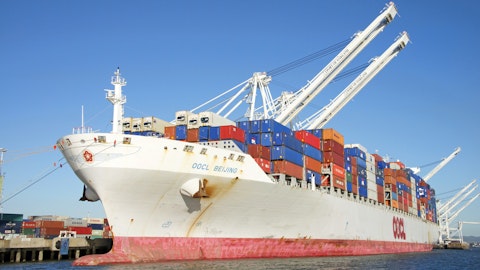In this article, we will look at the 15 most respected countries in Asia in 2024.
Today’s economic and political disruptions frequently position Asia at the forefront, as its economy has officially surpassed any other region in the world, bringing in a new era of Asian leadership. However, it’s important to recognize that Asia is not a monolithic entity. Spanning about 45 million square kilometers, nearly five times the size of Europe, Asia is incredibly diverse, encompassing around 2,300 languages compared to Europe’s 300, and featuring a wide array of cultural, linguistic, and political landscapes. Economically, the region exhibits significant variations in scale and composition.
Asia: The World’s Trade Hub
Asia’s substantial economic growth and role as the global manufacturing and trade hub underscore its critical global influence. Between 2015 and 2021, Asia accounted for 57% of global GDP growth. In 2021, it contributed 42% of the world’s GDP (at purchasing power parity), surpassing any other region. Asia’s dominance in global trade is evident, as it accounted for 53% of global goods trade in 2021, and 59% of trade growth between 2001 and 2021. According to a report by McKinsey, Asian corporations contribute approximately $19 trillion to the global economy annually. The continent is home to some of the world’s largest corporations, including semiconductor giant Taiwan Semiconductor Manufacturing Company Limited (NYSE:TSM). Back in 2000, Asia accounted for less than one-third of the world’s GDP in purchasing power parity terms. However, by 2040, the continent is expected to constitute more than 50% of the global economy. Additionally, by that time, Asia will also account for about 40% of the world’s consumption. China’s role is particularly significant, with 56% of the value flowing through the 20 largest global trade corridors involving China in 2021.
Narrowing on South Asia, the sub-region is projected to experience strong growth at 6.0% in 2024, primarily fueled by robust growth in India and economic recoveries in Pakistan and Sri Lanka. However, persistent structural challenges threaten sustained growth, hindering job creation and climate resilience. That said, the Jobs for Resilience report suggests that the region will remain the fastest-growing in the world for the next few years, with growth projected at 6.1% in 2025. However, despite this positive outlook, South Asia still faces significant challenges. Many countries in the region lack economic freedom, political stability, financial transparency, comprehensive market and labor reforms, and sufficient GDP growth. Growth in most countries remains below pre-pandemic levels and is heavily reliant on public spending. Additionally, private investment growth has slowed sharply across the region, and job creation is insufficient to keep pace with the rapidly increasing working-age population.
Over the past decade, numerous large corporations have outsourced parts of their operations to Asian countries. Apple Inc. (NASDAQ:AAPL), for example, is deepening its engagement with China while also expanding production in Southeast Asia and India, highlighting the company’s delicate balancing act between political pressures and business needs. In 2023, the company increased its number of China-based suppliers and manufacturing sites, reducing its dependence on suppliers from Taiwan, the U.S., Japan, and South Korea. Since 2020, Chinese suppliers have become the largest group within Apple’s supplier network, growing to 52 in the past year from 48 in 2022. As Apple Inc. (NASDAQ:AAPL) accelerates its supply chain shift to Southeast Asia amid the ongoing U.S.-China tech conflict, its ties with China continue to strengthen. Moreover, CEO Tim Cook emphasized the company’s success in South Asian markets, achieving all-time records in countries such as India. Analysts predict that in the coming years, Apple Inc. (NASDAQ:AAPL) will increasingly focus on countries like Indonesia, Malaysia, and India, which are expected to become significant contributors to the company’s global market share.

Pixabay/Public domain
Our Methodology
To compile our list of the most respected countries in Asia, we utilized the Human Development Index (HDI) and the Human Rights Index (V-Dem 2023). By averaging the scores from both indices, we derived an overall index score. The HDI evaluates a country’s well-being through factors such as education, life expectancy, and income. In contrast, the Human Rights Index assesses respect for human rights, emphasizing civil liberties and political freedoms, providing a comprehensive view that complements the HDI. A country excelling in both indices demonstrates a balanced approach, reflecting a society where individuals thrive economically and within a framework of justice and fairness. Such nations are globally respected for valuing both human development and human rights.
At Insider Monkey we are obsessed with the stocks that hedge funds pile into. The reason is simple: our research has shown that we can outperform the market by imitating the top stock picks of the best hedge funds. Our quarterly newsletter’s strategy selects 14 small-cap and large-cap stocks every quarter and has returned 275% since May 2014, beating its benchmark by 150 percentage points (see more details here).
15 Most Respected Countries in Asia in 2024
15. United Arab Emirates
Human Development Index: 0.937
Human Rights Index: 0.35
Insider Monkey Average: 0.643
The United Arab Emirates is a global center for international trade, finance, and investment, boasting one of the world’s most stable and prosperous economies. While oil and gas production have historically been key to its wealth, political stability, economic diversification, and globalization have also played significant roles.
As one of the leading oil exporters globally, the UAE achieved a GDP of $504.17 billion in 2023. However, the country has been actively working to diversify its economy away from hydrocarbons, attracting foreign investment, with non-oil sectors now contributing over 70% to overall growth.
14. Kazakhstan
Human Development Index: 0.802
Human Rights Index: 0.53
Insider Monkey Average: 0.666
Kazakhstan, Central Asia’s largest state and a resource-rich former Soviet republic, stretches from the Caspian Sea in the west to the Altai Mountains on its eastern border with China and Russia. According to the IMF, Kazakhstan’s GDP grew by 5.1% in 2023, while inflation dropped to 8.7% in April, thanks in part to lower international food prices and prudent monetary policy.
13. Nepal
Human Development Index: 0.601
Human Rights Index: 0.78
Insider Monkey Average: 0.690
Nepal’s shift from a centralized system to federalism in 2015 marked a historic moment for this nation of just over 30 million people. Every year, visitors from around the world come to experience the diversity and stunning natural beauty of this mountainous South Asian country. Renowned for its breathtaking landscapes, including Mount Everest, Nepal continues to rake in global admiration.
12. Jordan
Human Development Index: 0.736
Human Rights Index: 0.67
Insider Monkey Average: 0.703
Jordan, officially the Hashemite Kingdom of Jordan, is defined by its ancient monuments, nature reserves, and seaside resorts. It is home to the famed archaeological site of Petra. In the first quarter of 2024, Jordan’s GDP grew by 2% at constant prices compared to the same period last year. According to a report by the IMF, the national economy has remained “steadfast and resilient” despite facing “successive” challenges.
11. Kuwait
Human Development Index: 0.847
Human Rights Index: 0.59
Insider Monkey Average: 0.718
Ranking 11th on our list, Kuwait, one of the most urbanized countries in Asia, is a small but wealthy nation in the Middle East. Its capital, Kuwait City, houses a significant portion of the country’s population. The Kuwaiti economy is heavily reliant on oil production, with petroleum extraction and processing at its core. Kuwait achieved an HDI of 0.847 in 2022.
10. Indonesia
Human Development Index: 0.713
Human Rights Index: 0.73
Insider Monkey Average: 0.721
Indonesia, officially the Republic of Indonesia, is the world’s largest Muslim-majority country, granting it significant political influence. It is also renowned for its pristine beaches, particularly on the island of Bali, which attract tourists from around the globe.
Strengthening the country’s presence on the global stage, Microsoft Corporation recently announced plans to invest $1.7 billion in artificial intelligence and cloud services in Indonesia. Unveiled by Microsoft CEO Satya Nadella, the plan includes training 840,000 Indonesians in AI and providing support for the country’s growing community of tech developers. This marks Microsoft’s largest investment in Indonesia in its nearly three-decade history in the Southeast Asian nation.
9. Maldives
Human Development Index: 0.762
Human Rights Index: 0.74
Insider Monkey Average: 0.751
Renowned as a popular tourist destination, the South Asian archipelagic nation of the Maldives is surrounded by the Indian Ocean. Comprised of several islands, it is located southwest of India and Sri Lanka. The country’s tourism industry, thriving on its vibrant island ecosystems and marine life, directly contributes to over 30% of the nation’s GDP and accounts for over 80% of its foreign exchange earnings.
8. Sri Lanka
Human Development Index: 0.780
Human Rights Index: 0.73
Insider Monkey Average: 0.755
Sri Lanka is not only one of the most respected countries in Asia but also one of the most beloved, thanks to its stunning landscape and coastline. The government’s tourist-friendly policies, including visa on arrival or electronic travel authorization for visitors from 196 countries, further enhance its appeal.
The country’s tourism industry is rapidly recovering from the setbacks caused by the pandemic and internal political turmoil. In 2023, over a million tourists visited Sri Lanka, marking the first time the nation has surpassed this milestone in four years. Additionally, inflation has decreased from a peak of 70% in 2022 to 1.5% in April. The economy also expanded in the second half of last year after a year and a half of contraction.
7. Malaysia
Human Development Index: 0.807
Human Rights Index: 0.75
Insider Monkey Average: 0.778
The most beloved country in Asia according to Insider Monkey, Malaysia is a Southeast Asian nation located on parts of the Malay Peninsula and the island of Borneo. It is renowned for its beaches, rainforests, and a rich blend of Malay, Chinese, Indian, and European cultural influences. Malaysia is also the fifth most visited country in Asia, attracting over 10 million travelers in 2022. Additionally, the nation’s GDP grew by 4.2% in the January-March period compared to the previous year, driven by household spending and a rebound in exports.
6. Hong Kong
Human Development Index: 0.956
Human Rights Index: 0.616
Insider Monkey Average: 0.786
Hong Kong has long thrived as a gateway to and from mainland China. Its economy is driven by financial services, trading and logistics, tourism, and professional services, establishing Hong Kong as a prominent East-meets-West center. One of the last countries in the world to reopen after COVID-19, Hong Kong began its recovery in early 2023. Throughout the year, private consumption continued to grow, although imports and exports remained weak.





